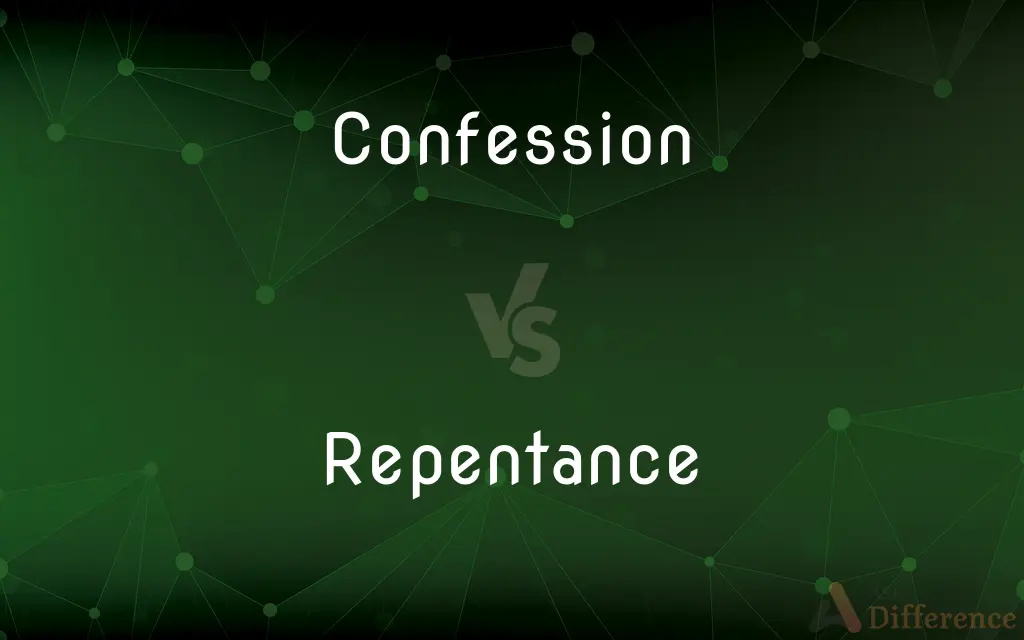Confession vs. Repentance — What's the Difference?
Edited by Tayyaba Rehman — By Maham Liaqat — Updated on March 20, 2024
Confession is acknowledging wrongdoing, while repentance involves regret and commitment to change.

Difference Between Confession and Repentance
Table of Contents
ADVERTISEMENT
Key Differences
Confession and repentance are two pivotal aspects of moral and spiritual frameworks, often used within religious contexts but also applicable to secular ethical understanding. Confession is the act of admitting to a wrongdoing or sin, recognizing and declaring one's faults or sins, often to another person or to a deity. This act is primarily about acknowledgment and transparency. On the other hand, repentance goes a step further by involving a deep sense of regret or remorse for one's actions, accompanied by a sincere commitment to change and avoid repeating the same mistakes in the future.
Confession is a crucial first step in the process of rectifying wrongs, as it involves the acknowledgment of one's mistakes or sins. It is a personal or communal admission of having done something that is morally or ethically wrong. Whereas repentance is characterized not just by this acknowledgment but by a transformative change of heart and mind. It implies a determination to turn away from the wrongful path and to embrace a more virtuous or right path moving forward.
In many religious practices, confession is seen as a sacrament or an essential ritual for spiritual healing and forgiveness. It often involves confessing one's sins to a priest or spiritual leader, who then offers guidance, penance, or absolution. Whereas repentance is viewed as a deeper, more personal process that may or may not involve a formal ritual but requires genuine sorrow and a personal commitment to improvement.
While confession can be done repeatedly for the same mistake as a form of seeking forgiveness or relief from guilt, repentance is ideally a one-time process for a particular sin or mistake, aiming at a complete turnaround from that behavior. Repentance is seen as a deeper and more meaningful change in one's life direction, indicating growth and moral improvement.
The dynamic between confession and repentance underscores the importance of not only recognizing and admitting to our wrongs but also taking concrete steps to correct them and prevent their recurrence. Confession opens the door to forgiveness and healing, while repentance ensures the sustainability of one's moral and ethical development by fostering genuine behavioral change.
ADVERTISEMENT
Comparison Chart
Definition
Admitting wrongdoing or sin
Regretting and resolving to change behavior
Focus
Acknowledgment
Transformation
Action
Often involves telling someone
Involves a personal commitment to change
Role in Religion
Can be a sacrament or ritual
Considered a deeper, spiritual process
Outcome
Seeks forgiveness
Aims for personal growth and moral improvement
Compare with Definitions
Confession
Acknowledgment of wrongdoing.
She made a confession to her friend about lying.
Repentance
Feeling regret for past actions.
His repentance was evident in his efforts to make amends.
Confession
Involves admitting specific sins or mistakes.
The criminal's confession included details of the crime.
Repentance
Can result from guilt or moral realization.
The documentary sparked a repentance in him for his past behaviors.
Confession
A ritual in some religions.
His confession took place in a small, dimly lit booth.
Repentance
A personal, often spiritual, journey.
His journey of repentance brought him closer to his family.
Confession
Can be private or public.
He wrote a public confession on social media.
Repentance
Aims for transformation and improvement.
True repentance is shown through actions, not just words.
Confession
Seeks absolution or forgiveness.
After her confession, she felt a sense of relief.
Repentance
Involves a commitment to change.
Her repentance led to volunteering at the shelter.
Confession
A confession is a statement – made by a person or by a group of persons – acknowledging some personal fact that the person (or the group) would ostensibly prefer to keep hidden. The term presumes that the speaker is providing information that he believes the other party is not already aware of, and is frequently associated with an admission of a moral or legal wrong: In one sense it is the acknowledgment of having done something wrong, whether on purpose or not.
Repentance
Repentance is the activity of reviewing one's actions and feeling contrition or regret for past wrongs, which is accompanied by commitment to and actual actions that show and prove a change for the better. In modern times, it is generally seen as involving a commitment to personal change and the resolve to live a more responsible and humane life.
Confession
The act or process of confessing, as in telling one's life story as a series of failings or tribulations.
Repentance
The action of repenting; sincere regret or remorse
Each person who turns to God in genuine repentance and faith will be saved
Confession
Something confessed, especially a disclosure of one's sins to a priest for absolution.
Repentance
The act or process of repenting.
Confession
Confession In some Christian churches, the sacrament of Penance.
Repentance
Remorse or contrition for past conduct or sin.
Confession
A statement made acknowledging guilt of an offense.
Repentance
The condition of being penitent.
Confession
An avowal of belief in the doctrines of a particular faith; a creed.
Repentance
A feeling of regret or remorse for doing wrong or sinning.
Confession
A church or group of worshipers adhering to a specific creed.
Repentance
The act of repenting, or the state of being penitent; sorrow for what one has done or omitted to do; especially, contrition for sin.
Godly sorrow worketh repentance to salvation.
Repentance is a change of mind, or a conversion from sin to God.
Repentance is the relinquishment of any practice from the conviction that it has offended God. Sorrow, fear, and anxiety are properly not parts, but adjuncts, of repentance; yet they are too closely connected with it to be easily separated.
Confession
The open admittance of having done something (especially something bad).
Without the real murderer's confession, an innocent person will go to jail.
Repentance
Remorse for your past conduct
Confession
A formal document providing such an admission.
He forced me to sign a confession!
Confession
(Christianity) The disclosure of one's sins to a priest for absolution. In the Roman Catholic Church, it is now also termed the sacrament of reconciliation.
I went to confession and now I feel much better about what I had done.
Confession
Acknowledgment of belief; profession of one's faith.
Confession
A formula in which the articles of faith are comprised; a creed to be assented to or signed, as a preliminary to admission to membership of a church; a confession of faith.
Confession
Acknowledgment; avowal, especially in a matter pertaining to one's self; the admission of a debt, obligation, or crime.
With a crafty madness keeps aloof,When we would bring him on to some confessionOf his true state.
Confession
Acknowledgment of belief; profession of one's faith.
With the mouth confession is made unto salvation.
Confession
The act of disclosing sins or faults to a priest in order to obtain sacramental absolution.
Auricular confession . . . or the private and special confession of sins to a priest for the purpose of obtaining his absolution.
Confession
A formulary in which the articles of faith are comprised; a creed to be assented to or signed, as a preliminary to admission to membership of a church; a confession of faith.
Confession
An admission by a party to whom an act is imputed, in relation to such act. A judicial confession settles the issue to which it applies; an extrajudical confession may be explained or rebutted.
Confession
An admission of misdeeds or faults
Confession
A written document acknowledging an offense and signed by the guilty party
Confession
(Roman Catholic Church) the act of a penitent disclosing his sinfulness before a priest in the sacrament of penance in the hope of absolution
Confession
A public declaration of your faith
Confession
A document that spells out the belief system of a given church (especially the Reformation churches of the 16th century)
Common Curiosities
Can confession lead to forgiveness?
Yes, confession can lead to forgiveness, especially within religious contexts where it is seen as a step towards absolution.
How do confession and repentance differ in religion?
In religion, confession often involves rituals or sacraments for admitting sins, while repentance is viewed as a deeper, personal process towards spiritual growth.
What makes repentance genuine?
Genuine repentance is characterized by sincere regret and tangible steps towards personal improvement and avoiding past mistakes.
Is repentance a one-time action?
Repentance aims to be a one-time commitment to change for a particular mistake, but the process of transformation can be ongoing.
Can someone repent without confessing?
Yes, it's possible to repent without confessing, as repentance focuses on internal change and commitment rather than external acknowledgment.
Do all religions require confession for forgiveness?
Not all religions require confession for forgiveness; the practices and beliefs vary widely among different faiths.
What does repentance involve?
Repentance involves feeling remorse for past actions and making a sincere commitment to change and avoid repeating those actions.
Why is confession important?
Confession is important because it allows individuals to acknowledge their faults, seek forgiveness, and relieve guilt.
What is confession?
Confession is the act of admitting wrongdoing or sin, often to another person or deity.
Can a person confess without feeling repentant?
Yes, a person can confess without feeling repentant, but such confession may lack the sincerity needed for true forgiveness and personal growth.
Can repentance affect personal relationships?
Yes, repentance can positively affect personal relationships by showing sincerity and commitment to change, leading to forgiveness and reconciliation.
Is there a psychological benefit to confession?
Yes, confession can offer psychological benefits such as relief from guilt and emotional healing.
How do confession and repentance contribute to moral growth?
They contribute to moral growth by encouraging acknowledgment of wrongdoing, fostering a mindset of continuous improvement, and facilitating ethical behavior.
How can one demonstrate true repentance?
True repentance can be demonstrated through sincere apologies, making amends, and changing behavior to avoid repeating past mistakes.
What role does repentance play in community healing?
Repentance plays a significant role in community healing by showing accountability, fostering forgiveness, and rebuilding trust.
Share Your Discovery

Previous Comparison
Cream vs. Lotion
Next Comparison
Green vs. YellowAuthor Spotlight
Written by
Maham LiaqatEdited by
Tayyaba RehmanTayyaba Rehman is a distinguished writer, currently serving as a primary contributor to askdifference.com. As a researcher in semantics and etymology, Tayyaba's passion for the complexity of languages and their distinctions has found a perfect home on the platform. Tayyaba delves into the intricacies of language, distinguishing between commonly confused words and phrases, thereby providing clarity for readers worldwide.















































